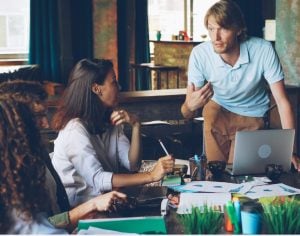What will the world be like post-covid? Whilst the virus will be around for some time yet, hopefully we are edging closer to finding out.
Throughout the crisis there has been much talk about using Covid as an opportunity to reshape society. It is vital that we keep these conversations going and turn them into positive action.
The pandemic has had a profound impact on us all, not least in the inequalities it exposed that will be impossible to forget. While the crisis brought out the best in communities who were ‘in it together’, it didn’t necessarily affect us all equally.
Certain groups like ethnic minorities were on average more adversely affected by the virus and its economic impacts. This was due to a host of complex social disparities that heightened their vulnerability – from housing and frontline jobs.
With such inequalities now glaringly obvious, it is impossible to justify returning to the ‘old world’. We truly need to build back better.
Small businesses were at the centre of the Covid response, and they will be the bedrock of recovery. We need to ensure that the amazing contribution of these entrepreneurs – from all backgrounds – are celebrated. And that the opportunities of entrepreneurship ‘ that gives people the chance to reach their potential, contribute to society and design their own destiny ‘ are shared inclusively throughout society.
Because the sad truth is that there are still too few businesses – just 5% – started by entrepreneurs from diverse backgrounds. According to the British Business Bank, these business owners tend to face persistent disparities in business outcomes, with systemic disadvantage playing a key role. At the height of the crisis it became clear that ethnic minority businesses were less likely to access government emergency covid-19 support.
This inequality often boils down to a lack of social capital. A somewhat intangible thing which is made up of the support and network that holds business owners up. Do they have access to the right help and advice? Is someone empowering them? Who is championing them and their business?
We need to make sure that as we move out of this crisis, turning inevitably to the small business economy to power us, that we do not have gaps in our view of what it means to be an entrepreneur in the UK. We must make sure that all small business owners have access to support, encouragement and opportunity to celebrate their achievements.
As the economy reboots, we must use this opportunity to restart the entrepreneurial community and make it more inclusive. This means more mentoring, more peer-to-peer support, and more access to training and skills, particularly for people starting from a lower base of support. This also means telling inspiring stories, and raising awareness of the contribution of all small businesses to the economy.
Small Business Britain launched i:Entrepreneur last year to champion founders from diverse backgrounds, to give them greater visibility, a greater voice, and highlight inequalities in access to support amongst many other things. The stories we have heard have been phenomenally impressive and this campaign is only getting started in its ambitions.
This year we also want to take a further step and champion another amazing group of entrepreneurs, also hit hard by the pandemic ‘ those small businesses run by disabled founders.
Over 20% of working age adults have a disability, and they are disproportionately more likely to start their own business than the population as a whole, but their access to support, visibility in the media and visibility to policy makers is woefully behind other entrepreneurs.
Last year the Innovation Caucus with Professor Tim Vorley launched the Supporting Diversity and Inclusion in Innovation report which found that there are huge barriers in place for disabled entrepreneurs ‘ inequalities in support, bias from business advisors or educational settings, and a much higher likelihood of entrepreneurs coming from a background of poverty or unemployment.
We would like to help change this. This year we are launching d:Entrepreneur to champion disabled founders, and work to encourage more disabled people to see starting their own business as a positive and rewarding pursuit.
So, what will the world look like post-covid? That is up to us. This virus that has radically changed our lives, has also shown that radical change is possible.
As the value and interconnectedness of society is more keenly felt than ever before, along with its fault-lines, we must seize this once in a life-time opportunity to repair and rebuild and make it fairer for all.
“
Share via:










































